Budapest has always been on my travel bucket list and with limited time in Europe, I had to squeeze it in somehow.
That said, I did my research and learned that a day trip to Budapest from Vienna is possible. The travel time by train is only less than 3 hours. While that can seem like a long time for some people, it's actually not that bad for me as someone who lived in Manila where one could be stuck in traffic for 3 hours during rush hours.
So here's what you need to know to be able to do a day trip to Budapest from Vienna:
How to Get to Budapest from Vienna
By Train
As mentioned earlier, Budapest is less than 3 hours away from Vienna by train, so this is the fastest and most convenient way to travel between the two cities. The train would take you from the main stations of both cities: Vienna Central Station, also known as Wien Hauptbahnhof and Budapest Keleti.
Just take the OBB train from Vienna Central Station, which costs €30 to €50. The travel time typically lasts between 2 hours 31 minutes and 2 hours 39 minutes. There's a train that leaves every hour.
While you can get tickets at the train station on the day of your trip, I would recommend booking in advance through Omio to get cheaper rates. The tickets can cost €24 to €33 if you're getting them online weeks before your trip.
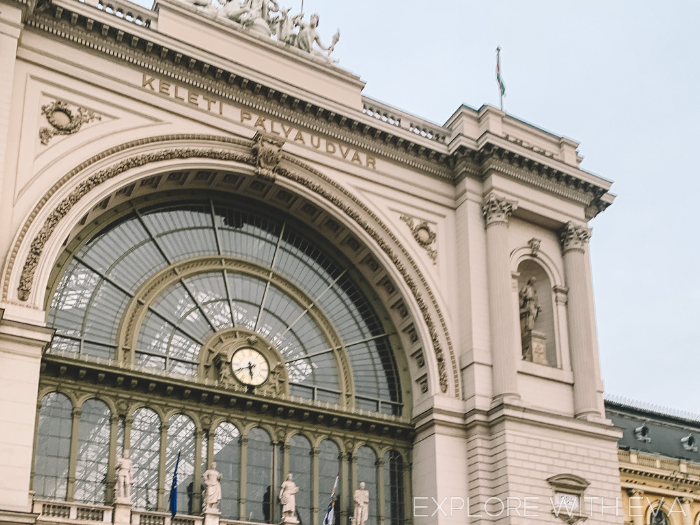 |
| The central train station in Budapest |
By Bus
The travel time from Vienna to Budapest by bus is slightly over 3 hours, which is not that bad. However, I wouldn't recommend this because the bus drop-off point in Budapest is outside the city center, which can be a bit inconvenient.
Remember that this is a day trip and you'd have to go back to Vienna the same way.
It is cheaper though, and it would only cost €12 to €15, depending on which bus company you book with. You can either book with FlixBus or RegioJet through Omio and as with trains, it's always better if you get your tickets in advance.
Budapest Day Trip Itinerary
Even though you can visit Budapest in one day, I really wouldn't recommend it if you want to experience everything that it has to offer. But if you only have limited time like me, then going on a day trip is the way to go.
And here's how you can maximize your trip to Budapest in one day.
Mária Magdolna Torony
Ideally, you start your day trip by going to the Fisherman's Bastion but instead of getting off at Batthyány tér, which is closer, I'd recommend getting off at Széll Kálmán tér. This is so you can see some hidden gems along the way.
One of them is the Mária Magdolna Torony, which is a Gothic-style church built between the 13th and 15th centuries and is one of the oldest churches in the Várkerület District.
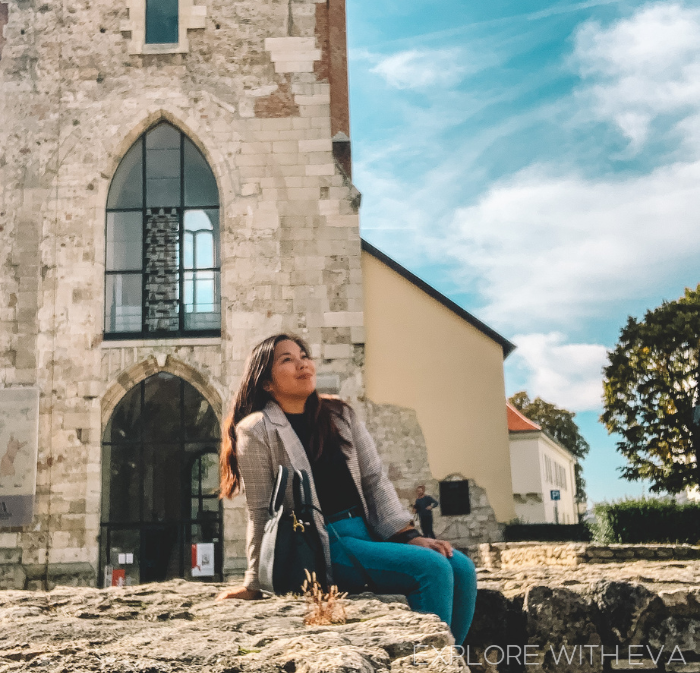 |
| with what's left of the Mária Magdolna Torony |
After visiting the church, I would suggest taking a quick stop in front of the National Archives of Hungary building which is a stunning Neo-Gothic-style building. Then walk along Fortuna Utca, a street lined with colorful houses and quaint shops. While these aren't major tourist spots to visit in Budapest, they're still worth checking out even for just a few minutes.
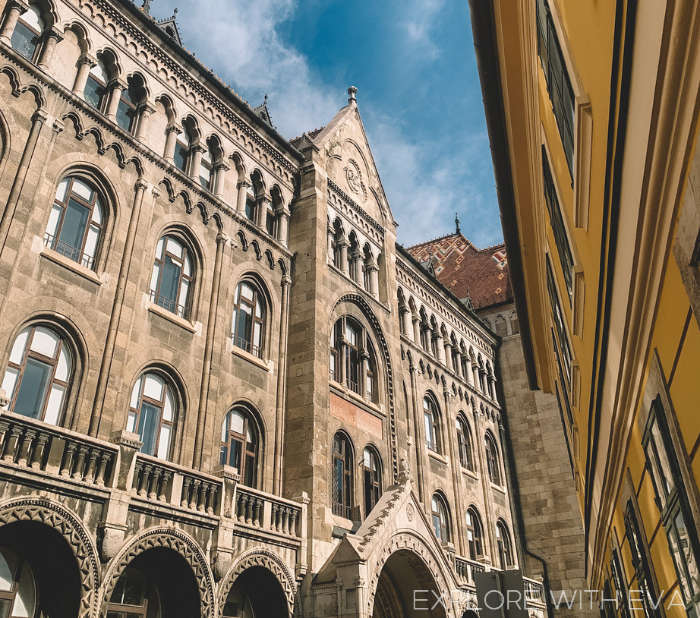 |
| the National Archives of Hungary |
The Fisherman's Bastion
From Mária Magdolna Torony, the Fisherman's Bastion is about 500 meters away. If you take the earliest train from Vienna, you should arrive in Budapest between 9 am and 10 am, which gives you about an hour at Fisherman's Bastion.
It's free to explore the Fisherman's Bastion but there's a fee of HUF 1,000 or approximately €3.40 if you want to go to the upper towers and balconies.
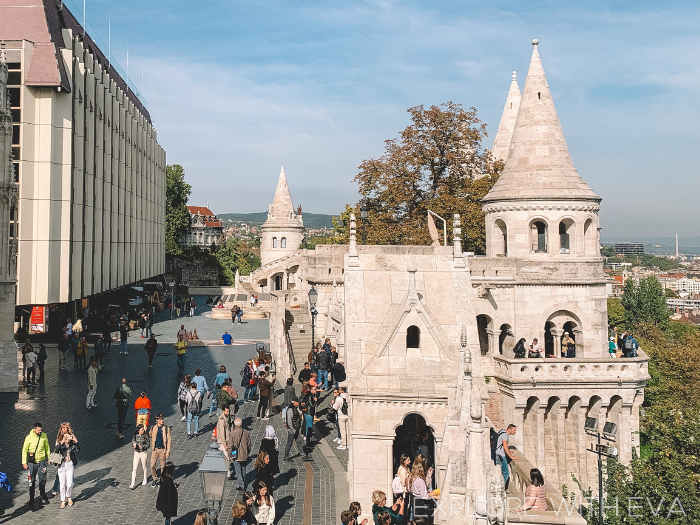 |
| the Fisherman's Bastion |
Matthias Church
Right next to the bastion is Matthias Church which is a Gothic-style Roman Catholic church. It's formally known as the Church of the Assumption of the Buda Castle.
For centuries, this church was used as a coronation venue for Hungarian kings, and then for 150 years, it was used as a mosque by the Ottoman Turks. Now it's a thriving Catholic church used for holy masses, concerts, and weddings, and is also a known tourist attraction. Entry to Matthias Church costs HUF 800 or roughly €2.10.
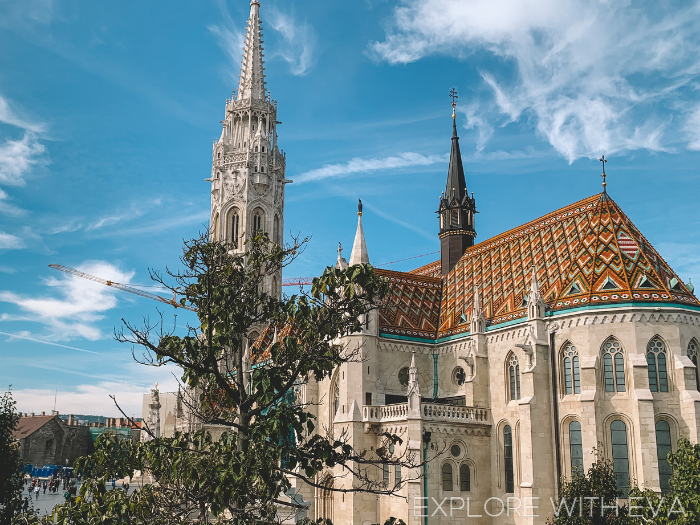 |
| Matthias Church |
Buda Castle
A UNESCO World Heritage Site, the Buda Castle is another must-see landmark when visiting Budapest. It's a historic castle that was first constructed in 1265. It now houses the Hungarian National Gallery which you can enter for €9 and the Budapest History Museum with an entry fee of €6.50, but you can see and explore the castle grounds for free.
 |
| Buda Castle |
After visiting the castle, it's time to explore more of the city outside of Castle Hill by taking the funicular going down. The ticket station and platform are just a couple of minutes away from Buda Castle. The ticket to ride the funicular costs HUF 3,000 or €8.
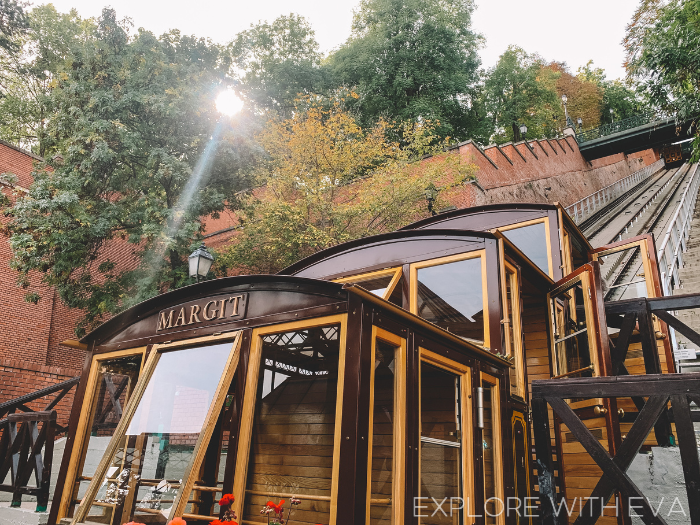 |
| Castle Hill funicular |
Széchenyi Chain Bridge
As of writing, this bridge is also currently closed to pedestrians as it's undergoing renovations. It is said to open during the Autumn of 2023.
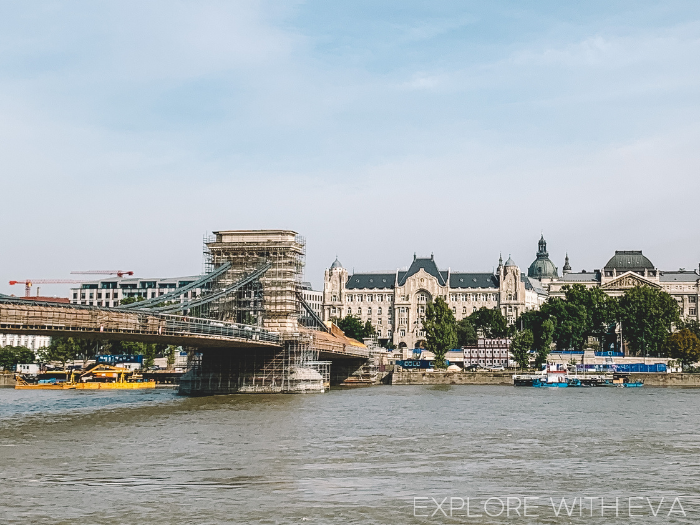 |
| the Chain Bridge - closed for renovations |
For now, you can cross to the other side of the river by walking on Elizabeth Bridge which is roughly 1 km away, or a 15-minute walk from the chain bridge or the lower station of the Castle Hill funicular. It may sound far but it's quite a scenic route as you walk along the Danube River on your left and you'll be treated to sights of old Hungarian buildings and statues on your right.
Inner City or Belváros
From the Elizabeth Bridge, just a few minutes walk is the Inner City of Budapest, which is a busy area on the Pest side of the Danube River. Here you will find lots of shops and restaurants, so if you need a break from all that walking, you can choose from the array of cafes and food places in this part of the city.
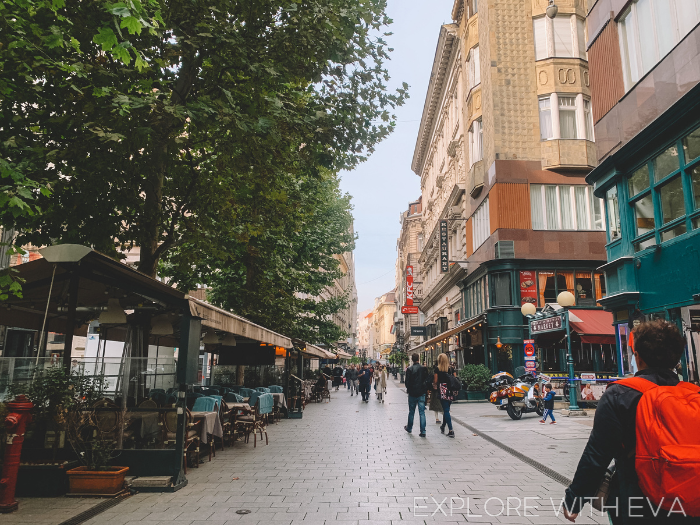 |
| Inner City streets lined with shops and restaurants |
This part of the city also features tourist attractions such as Elizabeth Square, the statue of the poet Mihály Vörösmart, and the Ferris Wheel of Budapest.
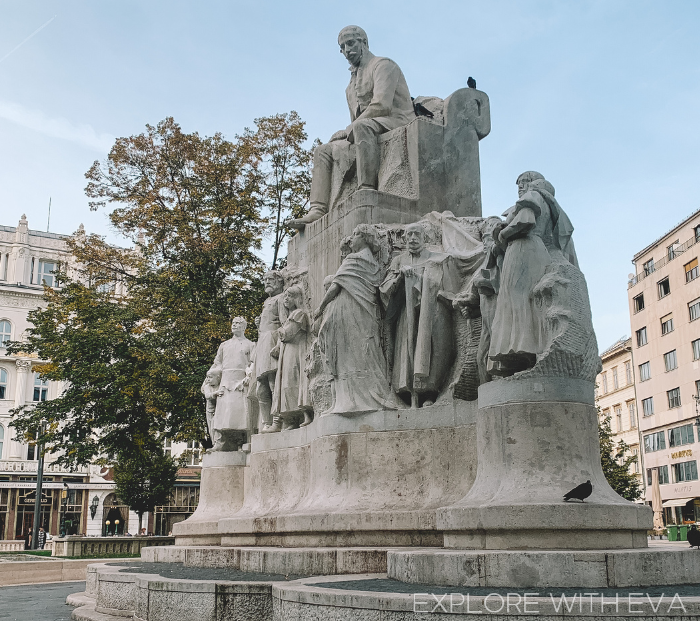 |
| Statue of the poet Vörösmart |
St. Stephen's Basilica
Also located in the Inner City is St. Stephen's Basilica. It is a Roman Catholic Basilica named in honor of Stephen, the first King of Hungary and whose right hand is housed in the reliquary. It was also the sixth-largest church building in the country before 1920.
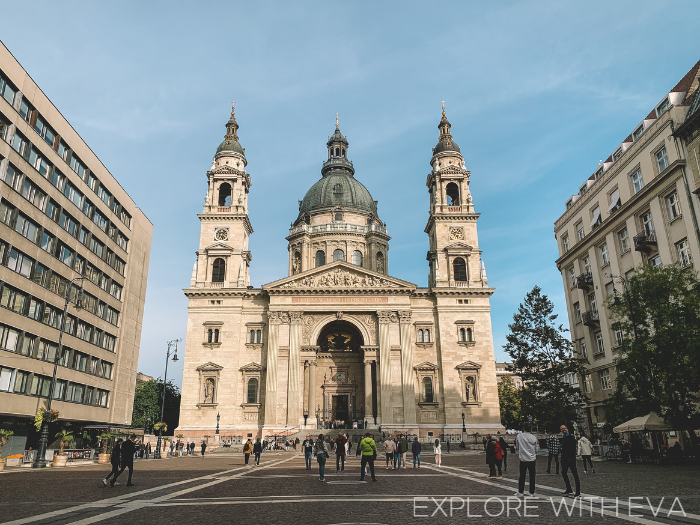 |
| St. Stephen's Basilica |
If you want to enter the basilica, there is an entry fee of €5.50 for adults and €2 for children.
Shoes on the Danube Monument
From the basilica, walk a few minutes to the west until you reach the Danube River again and you will find yourself on the other side of the Széchenyi Chain Bridge. Keep walking along the river in the direction of the Hungarian Parliament Building.
Here you will see the Shoes on the Danube Monument. This monument comprises brass shoes that are permanently affixed to the bank of the river. It serves as a memorial to the thousands of people, many of them Jews, who were murdered along the banks of the Danube River between 1944 and 1945. Before they were shot, the victims were forced to remove their shoes so as not to waste them.
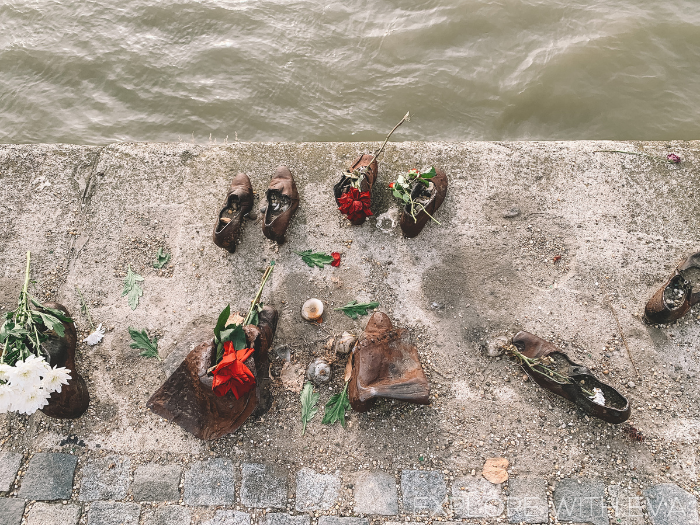 |
| Shoes on the Danube Monument |
The memorial comprises different styles and sizes of shoes, including women's and children's shoes, to signify that no one was safe during these killings.
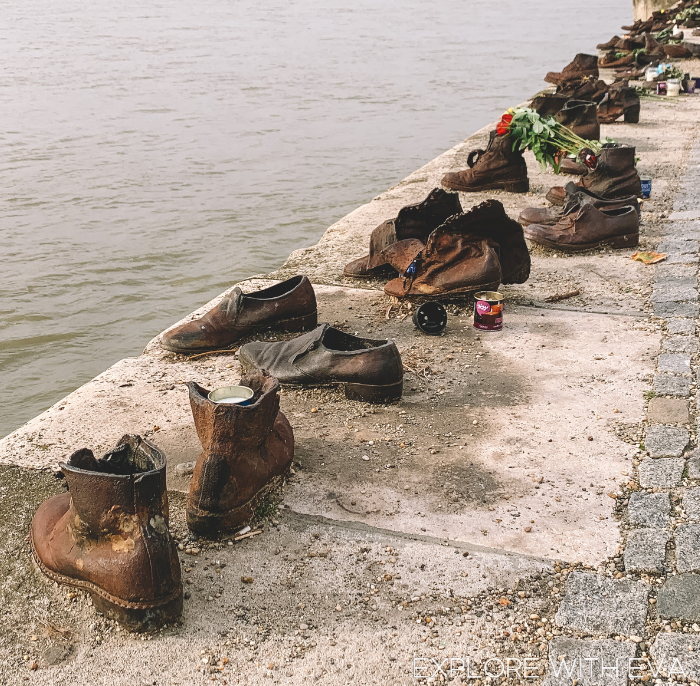 |
| Brass shoes on the bank of the Danube River |
This memorial is a solemn place where locals come to honor the victims. So if you're visiting, please be respectful and refrain from taking selfies. You may take photos of the brass shoes but don't have your photos taken with them.
Hungarian Parliament Building
If you've Googled photos of Hungary, then you may have seen this building many times. This is probably one of the most iconic and prominent buildings in the city. It's one of the tallest buildings in Budapest with an area of 18,000 sqm. It has 691 rooms, 28 entrances, 10 courtyards, and 29 staircases.
 |
| the Hungarian Parliament Building |
You can enter the building and take a 45-minute guided tour if you have enough time. The entry fee costs HUF 6,000 for non-EU citizens or around €15.80, while EU citizens get a discounted rate of HUG 2,400 or €6.3. There are also discounts for students, while children below 6 years of age can enter for free.
You can end the tour here and take the metro going back to Budapest Keleti so you can catch your train back to Vienna.
Other Things to Do in Budapest
If you have more time or if you're planning to spend a few more days in Budapest, then you can also check out these other attractions.
Cruise Along the Danube
Even though you've already seen the famous tourist attractions in the city, there's nothing quite like seeing them again from a different viewpoint by taking an evening cruise on the Danube River.
Enjoy this sightseeing tour of Budapest while cruising on the Danube and take in the landmarks and monuments on both shores. This experience includes an audio guide and a drink of your choice.
Relax at the Thermal Baths
Thermal baths are popular in Budapest. The city lies on a geological fault line that causes more than a hundred thermal springs to release warm, mineral-rich water. Thermal baths are said to be curative and calming, so they're recommended for healing certain health conditions.
So if you have more time in Budapest, I would recommend going to Széchényi Thermal Bath Palm House for a relaxing day spa experience.
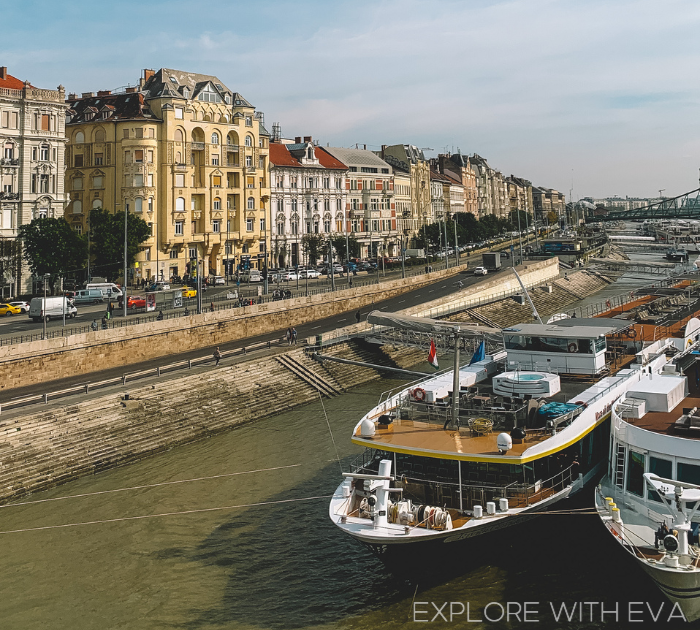 |
Budapest is definitely a must-see and I would suggest staying longer than I did. I would definitely come back to this city so that I can experience more of what it has to offer.
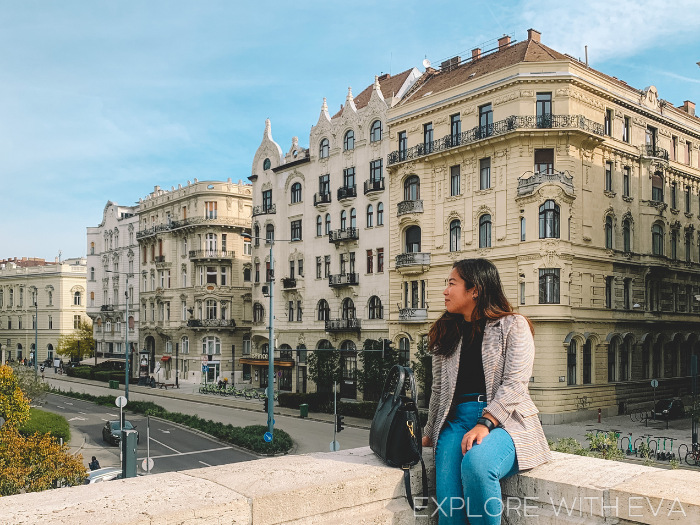



0 Comments